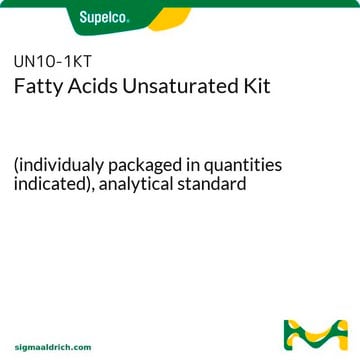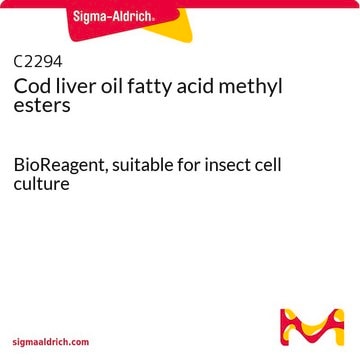F7050
Fatty Acid Supplement
Animal-component free, liquid, sterile-filtered, suitable for cell culture
Pharma Manufacturing
Sign Into View Organizational & Contract Pricing
All Photos(1)
About This Item
UNSPSC Code:
12352207
NACRES:
NA.75
Recommended Products
Quality Level
sterility
sterile-filtered
form
liquid
technique(s)
cell culture | mammalian: suitable
impurities
endotoxin, tested
functional group
carboxylic acid
shipped in
ambient
storage temp.
2-8°C
Application
Recommended for use at 0.25 to 0.5 ml per liter with CHO cells but is considered to have broader application.
Other Notes
Animal-component free. Proprietary aqueous mixture of fatty acids that have been found to be optimal for cell growth and protein expression.
related product
Product No.
Description
Pricing
Storage Class Code
10 - Combustible liquids
WGK
WGK 1
Flash Point(F)
Not applicable
Flash Point(C)
Not applicable
Personal Protective Equipment
dust mask type N95 (US), Eyeshields, Gloves
Certificates of Analysis (COA)
Search for Certificates of Analysis (COA) by entering the products Lot/Batch Number. Lot and Batch Numbers can be found on a product’s label following the words ‘Lot’ or ‘Batch’.
Already Own This Product?
Find documentation for the products that you have recently purchased in the Document Library.
Customers Also Viewed
Paul McCusker et al.
PLoS neglected tropical diseases, 10(9), e0004994-e0004994 (2016-09-14)
Fascioliasis (or fasciolosis) is a socioeconomically important parasitic disease caused by liver flukes of the genus Fasciola. Flukicide resistance has exposed the need for new drugs and/or a vaccine for liver fluke control. A rapidly improving 'molecular toolbox' for liver
Aris A Polyzos et al.
Cell metabolism, 29(6), 1258-1273 (2019-04-02)
The basis for region-specific neuronal toxicity in Huntington disease is unknown. Here, we show that region-specific neuronal vulnerability is a substrate-driven response in astrocytes. Glucose is low in HdhQ(150/150) animals, and astrocytes in each brain region adapt by metabolically reprogramming
Our team of scientists has experience in all areas of research including Life Science, Material Science, Chemical Synthesis, Chromatography, Analytical and many others.
Contact Technical Service









